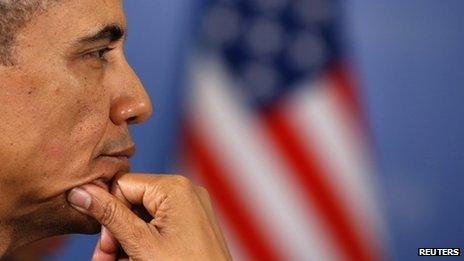Syria crisis raises question of US role in the world
- Published

President Obama has demonstrated reluctance to "go it alone" regarding strikes on Syria
The president is clearing his desk, going all-out to persuade for a vote that he has said is vital for America's credibility.
It is also a critical moment for American perception of itself as a power in the world. But in the details of the debate over Syria, the biggest questions and the larger picture are in danger of being lost.
In essence, it's whether the world needs a super cop. And whether the US should simply assume that role.
President Barack Obama - like UK PM David Cameron, like former US President George W Bush and former UK PM Tony Blair before them - has two main arguments for intervention in the Middle East. They overlap and intertwine, but they are distinct.
The first is national interest. Mr Obama says Syria does not pose an immediate threat to the US, but its willingness to use chemical weapons threatens its allies and bases in the region.
Less frequently his administration has suggested such weapons could fall into the hands of terrorists who could use them against America.
It is pretty obvious, the bigger the world power the more its vital interests may be harmed by something happening a long way away. If the whole Middle East is in uproar, it might not make a whole heap of difference to Paraguay or Latvia.
The argument for national interest is pretty clear. The desire to intervene for what you might call 'moral reasons', is far more murky.
Mr Obama and even more forcefully Secretary of State John Kerry have said that the world can't stand aside and witness such suffering. Particularly not when it breaches, if not international law, then international norms.
It is noticeable that it is senior politicians in the US, France and the UK who are keen on this argument of liberal interventionism. It is not just Russia that won't go along with it. China won't either.
China forcefully repeats that it wants the denuclearisation of its ally North Korea. But it is reluctant to force the issue.
But it is not just those in the communist country and the former communist empire which hold that view.
You hardly hear voices raised to demand military intervention from India or Brazil, Nigeria or Japan.
Countries on the doorstep of the various Middle East crises may want someone to do something, but look askance at the idea they might take on the task themselves.
A world policeman might have more moral authority if it wasn't one of the old imperial powers or the US, which while not technically the proud possessor of an empire, has a bigger footprint than any other country in the world.
I once put it to Tony Blair that the Iraq war might have been more credible if the call for action had come from Sweden. He made the obvious point: "Well, they couldn't do it, could they?"
Which makes me wonder about that old saying, "to a hammer, every problem is a nail". In this case, you have to wonder why the hammer was forged in the first place.
The British developed their military to defend a globe-spanning empire. The US developed its military might to intervene in Europe and then to challenge the USSR.
The absence of the original purpose has not eliminated an instinct to intervene.
Maybe the word "imperialism" makes you think of arguments "that it is all about oil" or crude land grabs.
But those Victorian imperialists really did think they were bringing civilisation and Christianity, order and the rule of law to people who couldn't climb to such dizzying heights on their own.
America's belief in its own mission is more universal and not driven by racism, but there is a similar zealous enthusiasm to remake the rest of the world in its image.
Of course, stopping the horror of chemical weapons is not the same as introducing democracy at the point of a gun.
But it raises the same question of who has the authority to make the judgment that norms have been violated, and who deals out the punishment.
The UN is meant to be the body that can order global cops into action. But the US says the Security Council is broken, because of the Russian veto.
While the Russian action does look cynical, it is a bit like a prosecutor saying the jury system doesn't work because he didn't get a conviction.
Or indeed, if David Cameron said parliament didn't work because of the "no" vote. President Obama understands how it looks to the rest of the world if the US goes it alone.
It is why he was so reluctant to take the lead over Libya, why he was so slow to develop a Syria strategy.
But he's decided now that even if no-one else (apart from France) is willing to step up to the plate, it is America's job to do so. Few at home or abroad seem to agree with him - but they don't have any other answer either.
- Published6 September 2013
- Published4 September 2013